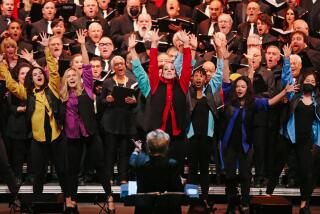Jubilee Singers Celebrate in Style
- Share via
Over the weekend, Los Angeles officially celebrated “Jubilee Sunday,” as in the Albert McNeil Jubilee Singers. You may not have known, but it was inescapable to the large crowd in the Dorothy Chandler Pavilion Sunday evening. There McNeil received encomiums from the Los Angeles City Council members and the county Board of Supervisors, and his singers celebrated the local ensemble’s 33rd anniversary with a marathon display of musicianship and showmanship.
Imagine a fine concert choir singing masterworks of the European classical tradition beautifully, entirely from memory and with choreography. That is basically what the Jubilee Singers did, only its repertory is drawn from African American vernacular traditions. The sophisticated but stylistically pure arrangements, however, have the harmonic palette of Poulenc and the rhythmic layers of Stravinsky.
Much of the music featured solo choristers accompanied by the full ensemble. Lyrical highlights were tenor Marc Summers’ soaring, searing plea in Hall Johnson’s arrangement of “Jesus Lay Your Head in de Winder,” soprano Rozlyn Sorrell’s chill, stratospherically spiraling grief in Jester Hairston’s arrangement of “Sometimes I Feel Like a Motherless Child” and soprano Lisa Naulls’ pristine, affecting simplicity in Miriam Makeba’s “NonQonQo.”
The Jubilee Singers backed its own with rare flexibility and assurance. Sometimes it took a moment for the tonal center of a piece to find critical mass, but when the ensemble was really going, as in Moses Hogan’s “I’m Gonna Sing ‘Til the Spirit Comes,” it proved a virtuoso choir on the most rigorous of musical terms.
Not all of the stage business and byplay worked convincingly, but for flat-out entertainment, it would be hard to beat the extended 70th birthday tribute to Harry Belafonte, cannily arranged by Larry Farrow with highly effective patterns of physical energy from choreographer Yvonne Farrow. The spirit of the thing was so fresh and open that even the inevitable audience sing-along on “Day-o,” acquired both humor and weight.
More to Read
The biggest entertainment stories
Get our big stories about Hollywood, film, television, music, arts, culture and more right in your inbox as soon as they publish.
You may occasionally receive promotional content from the Los Angeles Times.










